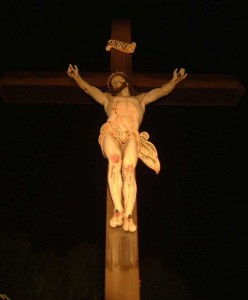The celebration of the sacraments is an ongoing altar call. For most Pentecostal churches, the altar call is the central event of the worship service. Sinners are encouraged to come forward to the altar to “pray through” to salvation. Believers are encouraged to come to the altar to pray for sanctification, or to “pray through” to the baptism in the Holy Spirit. During the altar service, those who are sick, or otherwise in need, are encouraged to come to the altar. There the church elders will anoint with oil, lay their hands upon the sick, and pray for healing. The celebration of the sacraments in Pentecostal worship should be understood as an opportunity to invite the saints of God once again to the altar to encounter the Holy Spirit in the celebration of water baptism, the Lord’s Supper, foot-washing, and the laying on of hands. Each sacrament directly corresponds to the redemptive work of the Holy Trinity. In this regard, the sacraments are an ongoing altar call in which the believer encounters God through the Holy Spirit.
Jesus’ Warning Signs of a Church in Decline
Several years ago I visited a Bulgarian Orthodox Church in Varna, Bulgaria as they were conducting a worship service. The building dated back to the 12th century and it was beautiful. The candles were glowing, and the incense was burning. The deacon was reading the gospel in an old Slavic language. The liturgy was awesome.
Continue reading “Jesus’ Warning Signs of a Church in Decline”
He is Risen!
There are no words more significant in any human language than the words spoken by the angel on that first Easter morning. On Good Friday, it seemed that death had claimed one more victim. For fear of their own lives, those closest to Jesus went into hiding. It was just a matter of time before the Roman soldiers would come to arrest them, and possibly each of them would be nailed to a cross of their own. It seemed that with the death of Jesus on the cross, all the hopes of his followers were banished forever.
Footwashing: The Fellowship of the Towel
Footwashing has been observed by the Church for centuries. Some early church fathers understood footwashing as a sacrament and associated it with water baptism. Others used the word “mystery” when speaking of footwashing, and presented it as a sacred rite independent of communion and baptism. Churches representing all Christian traditions, from Roman Catholic to Pentecostal, observe this sacred act. Footwashing has often been adopted by various renewal movements as a protest against abuses of ecclesiastical hierarchy. Because early Pentecostals understood themselves to be a renewal of the “church of the Bible” the practice of footwashing was embraced. Every member was encouraged to observe this sacred act on the basis of fidelity to the Bible and the unity of the Church. Some have questioned the validity of footwashing. However, there are many biblical reasons why we should observe footwashing regularly.
A View from the Cross

As the Roman soldiers hoisted the cross, with Jesus nailed to it, the Son of Man was being lifted up and he was drawing all humanity to himself (John 12:32).
Why I Love the Church
It has become popular sport to cheer the demise of the church. I guess it’s a part of the DNA of Protestantism to protest, even if it means protesting oneself out of the faith. I remember Bishop John Shelby Spong’s protest in his book Why Christianity must Change or Die. The spirit of Spong can now be read in the works of Brian McClaren, and others. The problem is that this is becoming mainstream. Even among Pentecostals, those over enthused fundamentalist, we hear some of the same. A friend recently shared a post in which someone listed “15 reasons I left the church.” That provoked me to ask myself, “Why do I love the church?” Well, I love the church because…
The Sure & Sudden Return of Jesus
Early Pentecostals maintained the conviction that the twentieth-century outpouring of the Holy Spirit was an eschatological event signifying the imminent, even immediate return of Jesus Christ.

